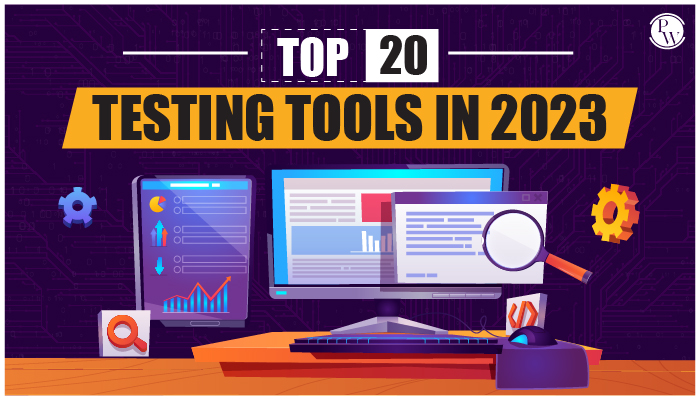What are Testing Tools?
Software testing tools are crucial for ensuring software reliability and effectiveness. They assess software’s quality and overall performance, enabling various testing tools, including unit and integration testing. Skilled testers use various technologies to evaluate software quality and ensure it meets standards.
There are two types of software testing tools: static and dynamic. Each type of testing requires specific tools to be used. Let’s take a closer look at these two categories of testing tools:
Static Testing Tools:
These tools are designed for static testing, which involves reviewing and analyzing the software’s code, design, and documentation. They help identify potential issues, inconsistencies, or errors in the early stages of the development process.
Dynamic Testing Tools:
On the other hand, dynamic testing tools evaluate the software’s behavior and performance during runtime. These tools relate to real-world scenarios, input different data sets, and monitor the software’s responses to ensure it functions correctly. By using the appropriate static and dynamic testing tools, software testers can effectively assess and improve the quality of the software being developed.
What is Software Testing
Software testing is the process of evaluating a software product to ensure it meets user requirements and is free from defects. Testing can be done manually or automatically, with the primary goal of identifying errors and missing requirements. You can improve reliability, security, and performance through testing, save time and money, and enhance customer satisfaction.
Experienced software testers use both manual and automated techniques to test software. Testers then communicate their findings to the development team to ensure the end product meets high-quality standards.
Recommended Course
- Decode DSA with C++
- Full Stack Data Science Pro Course
- Java For Cloud Course
- Full Stack Web Development Course
- Data Analytics Course
API Testing Tools
Tricentis:
Tricentis is a powerful testing tool specifically designed for application programming interfaces (APIs). This tool greatly assists in managing and executing test cases, reducing testing time, human effort, and costs.
Key features of Tricentis include:
- Self-contained SAP Testing: Tricentis offers comprehensive and efficient testing capabilities tailored to SAP systems. It ensures thorough testing of SAP applications, enabling reliable and high-quality performance.
- Mature and Strong SAP Test Automation Capabilities: Tricentis provides advanced automation capabilities for testing SAP environments. These capabilities help streamline testing processes, enhance efficiency, and improve testing outcomes.
- Integration with Solution Manager: Tricentis seamlessly integrates with Solution Manager, enabling smooth collaboration and information sharing between the testing tool and the project management solution. This integration enhances coordination and facilitates effective testing and project management.
By leveraging Tricentis as an API testing tool, organizations can optimize their testing efforts, achieve faster and more accurate test case execution, and ultimately deliver robust and reliable software products.
WebInject Testing Tools
WebInject stands out as a top-notch solution for testing online applications and web services through automated means. It is also versatile enough to assess individual system components via HTTP interfaces and conduct automated functional, regression, and acceptability tests.
Key Features:
- Gain real-time insights into HTTP response times while executing tests.
- Seamlessly integrate online and graphical user interface testing for mobile and desktop platforms.
- Compute and display timer statistics during runtime.
SOAPSonar API Testing Tool
SOAPSonar is a powerful API testing tool designed to automate the development and management of test cases. It allows for independent testing of each service within the client application while also providing the ability to group and automate the test procedures. The best part is that you don’t need programming or scripting skills to create or execute these test cases.
Key Features:
- Validate SOAP, XML, and REST services to ensure accuracy and reliability.
- Conduct performance profiling and concurrent client load testing using the Success Rule Framework.
- Perform web-based service security examinations to identify potential risks and implement necessary mitigation measures.
SoapUI:
SoapUI is a remarkable testing tool that has gained popularity due to its cross-platform compatibility and open-source nature. Developed in Java, it is a reliable solution for functional testing of SOAP and REST APIs. Its primary purpose is to ensure that APIs function properly and handle a significant load.
Key Features:
- The software boasts a user-friendly graphical interface, making it easy to navigate and utilize.
- The vulnerability testing feature is crucial in safeguarding websites against hackers and malware.
- With its robust reporting functionality, SoapUI enables comprehensive test results analysis.
- The tool offers SQL Injection capabilities, providing various common SQL queries and techniques to identify potential weaknesses in the application.
Mobile Testing Tools
Robotium: Mobile Testing Tools
Robotium is a highly effective test automation tool widely utilized for conducting user interface testing on Android devices. It can seamlessly execute both native and hybrid applications concurrently. This program is specifically designed to perform various types of testing for Android-based applications, including System Testing, functional testing, and user acceptability testing.
Key Features:
- With Robotium, you can easily record Android UI test cases within minutes, simplifying the test creation process.
- It supports test recordings using emulators and real devices, allowing for comprehensive testing scenarios.
- Robotium offers complete support for testing native and hybrid Android applications, including automatic resource ID detection, making test implementation more efficient.
Perfecto:
This software testing platform operates in the cloud, allowing app developers to conduct real-time web, mobile, and IoT application testing. It allows customers to choose deployment options that suit their specific project requirements.
Key Features:
- Seamlessly test mobile applications using the cloud-based infrastructure, ensuring efficient and reliable testing processes.
- The platform supports the Agile Environment, enabling developers to adapt and respond quickly to changes during the development lifecycle.
- It offers integration capabilities with other quality assurance testing tools like Selenium and Appium, allowing for enhanced testing capabilities and flexibility.
Appium:
Appium is a widely-used open-source testing tool specifically designed for automating the testing of mobile apps. It allows customers to test various types of applications, including native, mobile, web, and hybrid apps. Moreover, it simplifies the testing process by allowing the use of emulators and simulators.
Key Features:
- Appium allows you to test the actual app that will be released on the market, ensuring accurate results.
- It is a lightweight program requiring minimal memory usage during testing, making it efficient and resource-friendly.
- Native app testing with Appium does not require using a Software Development Kit (SDK); instead, it provides standard automation APIs compatible with multiple platforms.
Espresso:
Espresso is a user-friendly mobile testing solution designed to meet the needs of businesses. It offers simplicity and flexibility as an open-source tool, allowing you to extend its functionality within your working environment. The standout feature of Espresso is its test recorder tool, which enables you to create UI tests for your mobile app without the need to write any test code.
Key Features:
- With the Espresso Workflow, you can significantly reduce mobile testing flakiness, ensuring more reliable and consistent results.
- Developers benefit from timely and consistent feedback, helping them identify and address issues promptly.
- Creating test automation with Espresso is a breeze, thanks to its intuitive and straightforward approach.
ExperiTest:
Experitest is a comprehensive quality control tool developed specifically for mobile developers. It encompasses manual testing, performance testing, and load testing functionalities for mobile apps. What sets this testing tool apart is its compatibility with all major mobile operating systems, including iOS, Android, Windows Phone, and Blackberry.
Key Features
- Effortlessly create and execute automated tests on simulators or emulators hosted in Experitest’s reliable data center facilities.
- Save time and effort using the same test script across multiple mobile operating systems through the convenient record and replay feature. You can also automatically convert recorded tests into code.
- Generate detailed reports, including video or HTML-based reporting, providing valuable insights and visual documentation.
- Gain visibility into the element structure of mobile applications and easily create IDs, simplifying the testing and identification process.
Frequently Asked Questions
Q1. Which automation testing tool is trending?
Ans. The most popular automation testing tool is Selenium, an open-source tool used by Quality Analysts worldwide to test web applications. Its test automation is customizable across many languages and browsers.
Q2. In 2023 what will be the future of software testing?
Ans. Software testing is expected to remain broadly affected by digital transformation until 2023. As traditional industries undergo digital transformation, they invest in internal software testing teams.
Q3. Which tests are growing in popularity right now?
Ans. Robotic process automation, RPA We believe that robotics process automation has already started to play a part in software testing, and we’re confident this trend will continue through 2023 with greater acceptance. According to the research and market surveys, by 2027, RPA’s revenue will be around 3.4 billion US dollars.
Q4. Name the best testing model.
Ans. The V model is considered the best testing model because the development and test execution activities are carried out in the downhill and uphill shapes.
Q5. Is there any future testing?
Ans. The future of software testing looks promising due to the rapid development of technology, especially AI and ML.
Recommended Reads
Data Science Interview Questions and Answers
Data Science Internship Programs






